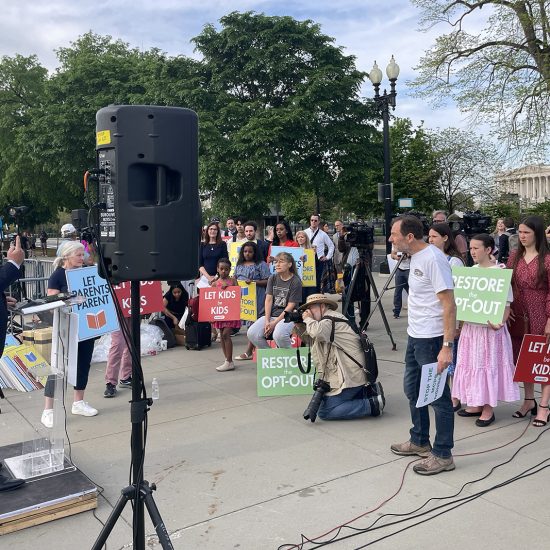
Evangelicals make incredulous claims — claims so huge people think they must be right otherwise they would be unbelievable. For example, some Christians are fond of saying they “hate what God hates.” The presumption that someone “hates what God hates” turns out to be exactly that: a presumption. We don’t know the mind of God in any way that might be considered complete. If we claim that we know the mind of God revealed in Scripture, we are not in a better position because our own prejudice in reading and interpreting the Bible may skew our understanding of what God hates.

Rodney Kennedy
I challenge the presumptions of anyone claiming they hate what God hates. Such a statement is a product of bad religion. The first indication of bad religion is the presumption that a preacher knows what he is talking about when he claims God is a hater. Rowan Williams says that “bad religion is about not trusting God.” Fred Craddock says, “There’s the gulf of bad religious experiences. Some people have had terrible religious experiences.” Imagine being a young person who is gay, who loves Jesus, loves the church, has trusted Jesus as Savior, has been baptized, and sits in church on Sunday and hears the preacher condemn being gay as an abomination and adds that “God hates gays.” Imagine that young man’s broken heart for a moment.
I challenge the presumption that they know what they say when they say “God.” Hauerwas says, “For it turns out that we are most likely to take God’s name in vain when we assume we can know what we say when we say ‘God.’” I accuse evangelicals of taking God’s name in vain when they attempt to put in God’s mouth their hateful language about gays. The word “god” can be easily hijacked for nefarious purposes. It can be used to legitimate power over people who are unable to defend themselves, to legitimate social formations that tempt Christians to abandon Christianity for secular power.
For god’s sake, we put “In God we trust” on our money. This is not the God of the Bible, but the god of America and capitalism. We added “one nation under God” to our pledge of allegiance. Today Christian Nationalists used the Pledge of Allegiance as their creed. The use of God in these political contexts makes God a useful commodity. It is thus acceptable in public forums of the state because there is no specific faith tradition attached to it. How easy it is for people to corrupt the word “god.”
It is ironic that evangelicals, charged with proclaiming the gospel of Jesus are more likely to invoke the American god — the generic god that can be given any meaning that anyone desires. This helps legitimize the violence of the state. Hauerwas makes clear, “If you are to minister to a church that is an alternative to a nation-state that has co-opted the word ‘god’ as a means of legitimating the violence it calls peace, you should insist that it makes all the difference that when the church says ‘peace’ the peace that is said requires that we also say ‘Jesus.’”
Second, I challenge the presumption that evangelicals know what God hates. This is not to ignore that there are biblical attempts to delineate what God hates. Proverbs 6, for example, provides a list of what God hates: “There are six things that the Lord hates, seven that are an abomination to him: haughty eyes, a lying tongue, and hands that shed innocent blood, a heart that devises wicked plans, feet that hurry to run to evil, a lying witness who testifies falsely, and one who sows discord in a family.”
That list may surprise those who think God hates gays. The list sounds more like a typical day in Washington, D.C., doesn’t it? The idea that God hates the way we do politics is not that far-fetched. Zechariah pinpoints God’s hatred in the political realm: “These are the things that you shall do: speak the truth to one another, render in your gates judgments that are true and make for peace, do not devise evil in your hearts against one another, and love no false oath, for all these are things that I hate, says the Lord” (Zech. 8:16 – 17).
The biblical witness seems clear that God hates idolatry: “Yet I persistently sent to you all my servants the prophets, saying, “I beg you not to do this abominable thing that I hate!” (Jeremiah 44:4).
Amos also has a clear vision of what God hates:
I hate, I despise your festivals,
and I take no delight in your solemn assemblies.
Even though you offer me your burnt offerings and grain offerings,
I will not accept them,
and the offerings of well-being of your fatted animals
I will not look upon.
Take away from me the noise of your songs;
I will not listen to the melody of your harps.
But let justice roll down like water
and righteousness like an ever-flowing stream (Amos 5:21-24).
Psalm 11:5 claims that God hates violence. God hates wickedness. Malachi says that God hates divorce. “For I hate divorce, says the Lord, the God of Israel, and covering one’s garment with violence, says the Lord of hosts. So take heed to yourselves and do not be faithless” (Malachi 2:16).
Third, I challenge the presumption that God hates any human beings or any entity in God’s created world. God’s agenda is open for all to see: peace and praise. There’s no hate in the Godhead. The love between the persons of the Trinity is at the very heart of the Christian faith. The New Testament writers have nothing to say about what God hates. John insists that God is love. “God is light and in him there is no darkness at all.” This matters because hate originates in darkness, in rebellion against God’s purpose of peace and praise.

Cherry Laithang / Unsplash
Finally, I challenge the presumption that preachers have the right to say “I hate what God hates.” When preachers make hateful, demeaning, judgmental statements they usually put the blame on God. When Wiley Drake prayed for God to kill President Obama, he claimed that people should not be mad at him because he was merely saying what God said. This is a false claim because God has not said that God wishes for the death of anyone. Drake, like other preachers before him, and politicians like Lauren Boebert, are using verses from Psalm 109:8-13. This is one of the imprecatory prayers whose purpose is to show the depth of human agony and despair when faced by implacable and unjust rulers. These psalms are gut-wrenching, human prayers and not the utterances of the God of love. The presumption of Drake and Boebert are presumptions.
Franklin Graham has used the same excuse. After using the Bible to defend his harsh statements about gays, Graham doubles down by dragging God into the arena of the accusation of hate. Graham points out, “They say, ‘Well, you’re offending a lot of people. I’m not offending them, but God’s offending them, because it is what God says. But my message is not against gay people, or people that think differently or worship differently from us. My message is about love.” It’s hard to decipher Graham’s talking out of both sides of his mouth, but I am concentrating on his presumption that God is offended by the presence of gay people. This is an unbiblical, unchristian, and hateful statement from Graham. He makes it worse by insisting that his message is about love.
If we feel obligated to make presumptions, then let’s go with the realism of Job and Psalms, which both depend upon the presumption that God is God and we are not. Let’s own up to our shortcomings and our lack of knowledge. We don’t always know the mind of God. Paul said it was his desire. He taught us to have the mind of Christ, but we seem rather cavalier about the effort.
It is hard to be patient with the arrogant presumptions of those who speak of God with such certainty. I have lost all patience and Christian charity for these merchants of hate, as well as the perorations and tirades of preacher moralists, gravely and condescendingly informing us that they and they alone know what God hates. But, obviously, it is hard not to become impatient at disquisitions on the hatefulness of God confidently delivered by persons who have made no discernible effort to ascertain who God is.
It seems a curious delusion — but apparently it is one shared by a great number of the more passionate evangelicals — to imagine that Christianity has never at any point during the two millennia of its intellectual tradition chosen mercy and grace, empathy, and compassion over prejudice and hatred. The Bible has been read for too many centuries by those with the power to authorize appalling abuse, mistreatment, and even murder of Jews, women, and gay people.
To badmouth God as a hater doesn’t inspire a positive response to the Christian faith; it freezes people’s hearts. To claim God is a hater is first and foremost to put the preacher on a pedestal as if he is Moses returning from Sinai with the Ten Commandments. Instead, he is just a little man, a cipher in the clog of injustice.
Enough of the presumptions of evangelicals. The time has come to fight the cruelty imposed on others in the name of God. As surely as we finally mustered the courage to condemn slavery, now we must show the same courage and the same willingness to speak up for all Others who have been so shamed, so harmed, and so horribly treated for so long.
Rodney Kennedy has his M.Div. from New Orleans Theological Seminary and his Ph.D. in Rhetoric from Louisiana State University. The pastor of 7 Southern Baptist churches over the course of 20 years, he pastored the First Baptist Church of Dayton, Ohio – which is an American Baptist Church – for 13 years. He is currently professor of homiletics at Palmer Theological Seminary, and interim pastor of Emmanuel Friedens Federated Church, Schenectady, New York. His sixth book – The Immaculate Mistake: How Evangelicals Gave Birth to Donald Trump – is now out from Wipf and Stock (Cascades).






